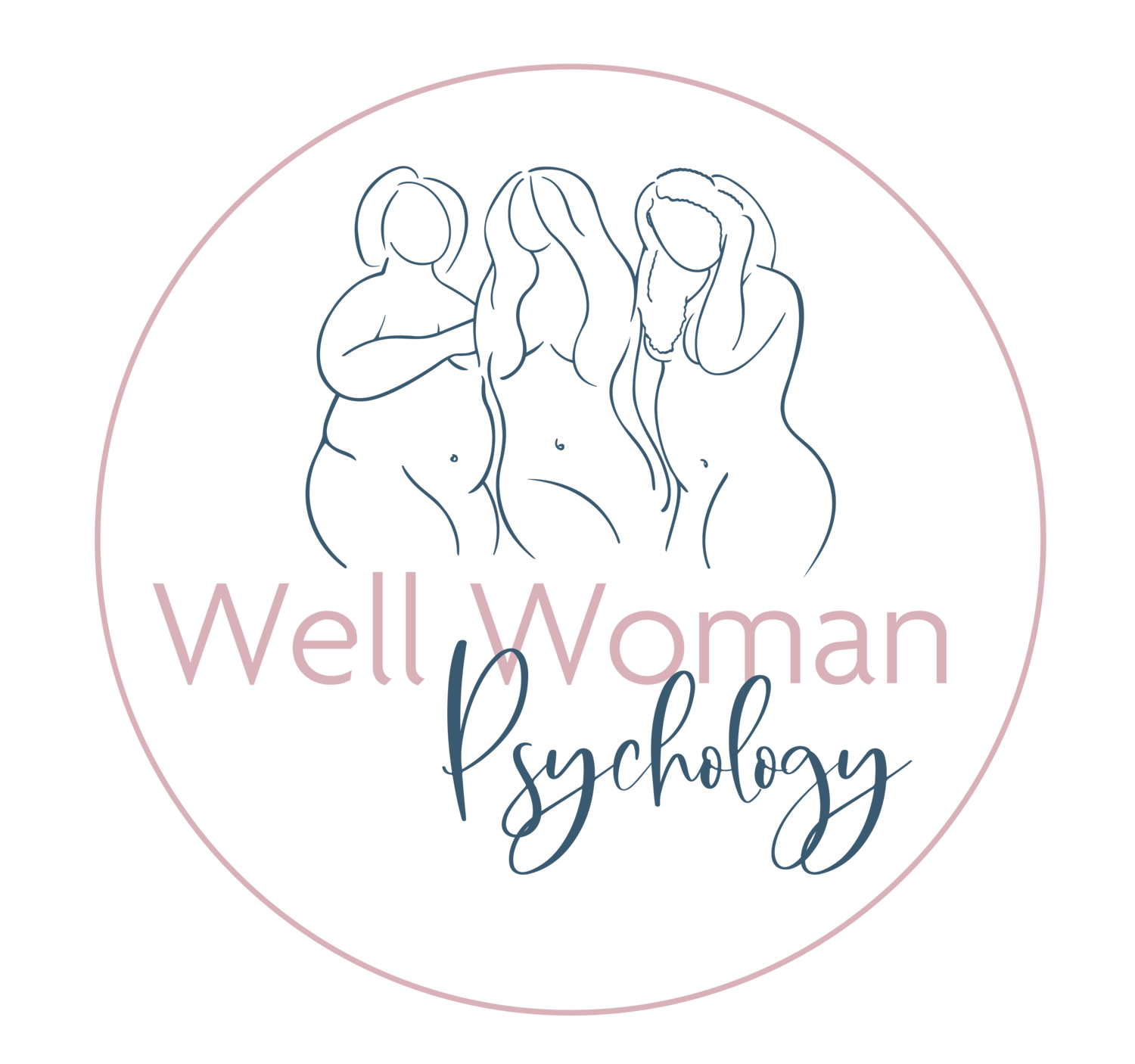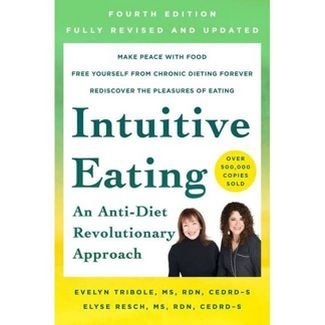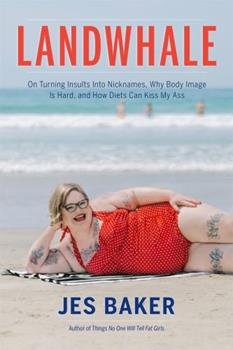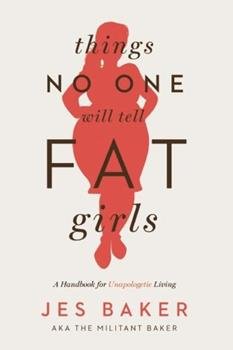My Favorite Resources to Improve Body Image & Fight Weight Stigma
I have been itching to write this blog post about resources for body image improvement for ages. Why? Three main reasons.
Representation, Reinforcement, & Support
Clients are always asking me in body image therapy for resources to help improve the way they feel about and treat their bodies. Most people, regardless of size or shape, struggle with their body image, and no wonder. Anti-fat bias is the root of body dissatisfaction and shame and, unfortunately, it is the air we all breathe. Along with sexism, racism, ableism, and transphobia which also teach us about which bodies are “good” and “bad”. Nobody is born hating their body and body shame doesn’t occur in a vacuum.
In other words, the problem is not with individuals’ body image - the problem is widespread harmful anti-fat bias that incorrectly teaches us all to view fatness as the worst thing you can be.
People are hungry (no pun intended) for any kind of resource to aid them on their journey to live more peacefully with their bodies. Also, seeing larger bodies wearing fabulous clothes, being loved and successful, and living their best lives, is really important for starting to shift how we see bodies. Representation matters.
Body Image Resources Sparked My Journey
Body image resources like this are single-handedly what started me on my own personal journey. They helped me shift from the misery of diet culture and fatphobia to a place of liberation, health, and peace with my own body. These resources opened my mind (blew my mind, actually) and gave me new ideas and perspectives. They armed me with vital information that I did not previously have access to due to anti-fat bias. I want to pay this forward not only as someone who has gained so much from these resources but also as a body image therapist, so that it can help spark other people on their journeys.
Our Bodies Are Not The Problem
Learning about anti-fat bias is what helps us overcome it and be better allies to folks in larger bodies. Weight stigma and anti-fat bias are forms of systemic oppression that harm everyone, with the largest bodies being the most harmed and discriminated against. While all sizes can have a poor body image, thin privilege means that people with smaller bodies are not systemically discriminated against like people with larger bodies.
The key to unlearning to hate your body and be affirming and non-oppressive to others is to unlearn all of the harmful and inaccurate narratives we learn about bodies, particularly around the worth, health, and lovability of larger bodies. This is critical regardless of if you are a size 0 or a size 40 - anti-fat bias teaches people body to hate their bodies and/or live in fear of fatness. It also results in size-based discrimination and oppression, which is experienced more intensely as body size increases.
As you start to unlearn these harmful messages, you will work toward recognizing anti-fat bias (and racism and classism which is where anti-fat bias started) as the problem, rather than body fat and large bodies.
Lean into the Discomfort
I want you to be prepared for something. As you start to explore these resources you are likely to feel quite defensive and/or uncomfortable. You may be feeling unwilling or unable to believe what you are hearing because it is so counter to what you believe and have learned and “common sense.” You may want to dismiss it outright, telling yourself “this is bullshit,” and turn away. On the other hand, you might tell yourself “this may be true for other people, but this doesn’t apply to me.”
This is a completely normal and important part of the process and I want you to lean into it.
If you’ve ever done any anti-oppression work, perhaps you can remember how uncomfortable and defensive you likely felt the first time someone or something challenged your perspective. It is what happens whenever the dominant narrative (racism, sexism, ableism, etc.), with all its hard-to-see privilege and bias, is challenged. We often don’t even realize the dominant oppressive narrative has taken root in us and noticing discomfort and defensiveness when it is challenged is one of the first indicators that it has. However, it is the air we all breathe- safe to say it has taken root in all of us.
It is a Path to Growth
So this work is super uncomfortable and also super important. Hang in there with the discomfort and keep going. It’s the only path to growth. Years ago, the first time I was ever exposed to anti-diet and fat-liberation ideas, I thought it was complete bullshit. But I pressed on and I now see I was so uncomfortable and defensive to it because it seriously challenged my own fatphobia, to which I was very attached without even realizing it. I didn’t know I had anti-fat bias at the time.
Ask yourself the following questions to help you lean into and grow from the discomfort and keep going:
Why am I having such a strong reaction to this?
If I reject this, what is that protecting me from?
What would I have to face if I accepted that this was true?
If this were true what would it mean? What would it mean about me?
What feelings am I having and why?
Is there something that I need to keep going?
How These Resources for Body Image Help
If you are just starting out, my hope is that with time these resources start to plant seeds of social justice and self-acceptance. That will hopefully germinate into an inclusive, compassionate, liberated relationship with your body. As well as arm you to advocate for others and yourself. If you are already working toward a more compassionate and peaceful relationship with your body, I hope these resources for body image help deepen your work and propel you forward. Exposure to a variety of bodies living full lives is essential to repairing your relationship with your body. Representation matters!
All bodies are good bodies and you deserve to take up space! Happy exploring! I will update this as I learn of new resources. If you know of any that you think should be added, please let Well Woman Psychology know.
Note: Because representation matters in all the ways, not just size, the below list includes creators who identify as BIPOC, disabled, trans and non-binary, queer, and fat. I want anybody who reads this list to be able to find people who look like them and am always looking for additional resources. However, especially if you are in a privileged group (not fat, white, able-bodied, etc.), I also encourage you to explore resources from people who don’t look like you. There is much valuable learning to be had from doing so.
My Favorite Body Image Resources…
Podcasts:
Body Trust by the Center for Body Trust. A podcast about collective healing and the radical journey of body reclamation in a culture of anti-fatness, weight stigma, disordered eating and other traumas.
Burnt Toast by Virginia Sole-Smith. Independent anti-diet journalism that navigates diet culture, feminism, and fatphobia, especially through health, fashion, and parenting (but non-parents like it too!). Part of the same Burnt Toast newsletter listed below.
Dietitians Unplugged: Dietitians Aaron Flores and Glenys Oyston explore all things food and body with sass. They have an excellent lineup of guest speakers, including yours truly on Episode 48 speaking about sex and body image.
Food Psych: Hosted by Christy Harrison, a registered dietitian, this popular podcast has a ton of episodes. Harrison answers listener questions that resonate deeply with the audience. She also welcomes a variety of excellent guest speakers.
Maintenance Phase: “Wellness and weight loss, debunked and decoded.” Hosted by Aubrey Gordon who is the person behind @yrfatfriend, the excellent Your Fat Friend blog, and the author of What We Don’t Talk About When We Talk About Fat.
Rebel Eaters Club: Fat Latina activist and author Virgie Tovar covers all sorts of topics related to weight discrimination and body image. She also has a background in studying sexuality!
She’s All Fat: A diverse group of hosts creates a space for “fat activism, radical self-love, and chill vibes.”
Swipe Fat: A plus size dating podcast.
Unsolicited; Fatties Talk Back: A diverse group of fat activists re-answers old advice columns from a fat liberation lens that is inclusive of all forms of diversity
Newsletters:
Burnt Toast by Virginia Sole-Smith. See above.
Weight and Healthcare by Ragen Chastain. Examining weight science, weight stigma, and what evidence, ethics, and lived experience teach us about best healthcare practices and public health for higher-weight people. Great for folks who want to dig into science in a digestible (no pun intended) way. Or those who struggle with the thought “but what about health?” Also great for people who work in healthcare and want to be allies to all patients.
HAES Healthsheets. While not a newsletter exactly, this library of PDFs is an excellent resource for learning about weight-neutral care for different common health conditions, what the research says on size related to said health condition, and what evidence based interventions may help.
Online Workshops:
Be Your Own Beloved: Photographer Vivienne McMaster uses self-portrait photography to help people see themselves with kinder eyes and become more comfortable both in photos and in their bodies.
Center for Body Trust: Therapist-led workshops to help you heal your relationship with your body and build body trust. Equity pricing is available.
Dances with Fat monthly online workshops by Ragen Chastain. Cannot recommend these enough if you are having to cope with the fatphobia of other people, just want to learn more about how you can be an ally to people in larger bodies, or are interested in the intersection of weight and health. The workshops on how to deal with fatphobia at the doctor’s office are extremely helpful. Equity pricing is available.
TV & Film:
Dumplin’ (2018, Netflix): A coming-of-age comedy, this movie follows Willowdean, the plus size daughter of a former beauty pageant queen, as she proves a point about measuring up and fitting in. Based on a young adult novel by the same name by Julie Murphy.
Lizzo’s “Watch Out For The Big Gurrrls” (2022-, Amazon Prime): Seriously, who doesn’t love Lizzo? This reality competition centers on Lizzo’s search for her next plus size backup dancers, but it is so much more than that. Provocative, uplifting, hilarious, feel good TV that takes square aim at fatphobia and highlights diverse fat women as the talented, sexy people they are, showing that representation really does matter. Lizzo also won an Emmy for this show and her acceptance speech is worth a watch.
Shrill (2019-21, Hulu): Sadly this was canceled after only 3 seasons, but it was beloved by women everywhere nonetheless. Aidy Bryant of SNL fame stars as Annie, a journalist trying to change her life without changing her weight. Her best friend Fran, played by Lolly Adefope is also a delight, and of course who can forget the iconic fat pool party scene! Based on Lindy West’s book Shrill: Notes From a Loud Woman.
Survival of the Thickest (2023, Netflix): Michelle Buteau’s comedy-drama show based on her series of essays.
Fat Fashion:
Mia O’Malley: @miomalley
Pretty Pear Bride: @prettypearbride
The Curvy Fashionista: @thecurvyfashionista
Follow the #fatfashion hashtag
Dietitians, Docs, & Public Health:
Asher Larmie: @thefatdoctoruk
Dalina Soto: @your.latina.nutritionist
Gregory Dodell: @everything_endocrine
Janice Chow: @janicehychow.rd
Jess Campbell: @haesdoctor
Jessica Wilson: @jessicawilson.msrd
Monica Kriete: @fattymph
Ragen Chastain: @ragenchastain
Whitney Trotter: @whitneytrotter.rd
Body Image Therapists & Mental Health Support:
Alishia McCullough: @blackandembodied
Ashlee Bennett: @bodyimage_therapist
Brianna Campos: @bodyimagewithbri
Lisa DuBreuil: @lisajdubreuil
Rachel Millner: @rachelmillner
Sam Dylan Finch: @samdylanfinch
Sand Chang: @heydrsand
Reproductive Health:
Elizabeth Armstrong, LPC: @pcostherapist
Jen McLellan: @plussizebirth
Kayla Stansberry: @fatpositivetherapist
Kaytee Crawford: @doulakaytee
Laura Ellington: @plussizepregnancy
Nicola Salmon: @fatpositivefertility
PCOS Body Liberation: @pcosbodyliberation
PCOS Nutrition Center: @pcosnutrition
Fitness:
Body Liberation Hiking Club: @bodyliberationhikingclub
Ilya Parker: @decolonizing_fitness
Fat Girls Hiking: @fatgirlshiking
Jessamyn Stanley & Underbelly Yoga: @mynameisjessamyn and @theunderbellyyoga
Joyn: Body-inclusive fitness classes
Keri Harvey: @kharveyfit
Laura Burns: @radicalbodylove
Lauren Leavell: @laurenlevellfitness
Lindsey Strobel: @fatbodypilates
Louise Green: @louisegreen_bigfitgirl
Meg Boggs: @meg.boggs
Rachel Piper: @sizediversepilates
Other Body Positivity & Fat Liberation:
Ample + Rooted: @ampleandrooted
Aubrey Gordon: @yrfatfriend
Fat Girls Traveling: @fatgirlstraveling
Imani Barbarin: @crutches_and_spice
Lindley Ashline: @bodyliberationwithlindley
Marquisele Mercedes: @fatmarquisele
Megan Crabbe: @meganjaynecrabbe
Nalgona Positivity Pride: @nalgonapositivitypride
Shelby Gordon: @fit.flexible.fluid
Swipe Fat: @swipefat
Victoria Welsby: @fierce.fatty
Virgie Tovar: @virgietovar
Virginia Sole-Smith: @v_solesmith
Books:
Note: All books recommendations are linked to bookshop.org, which connects people with independent bookstores in their communities. You can also filter the stores to search for a minority-owned bookstore to support. The bookstore I choose to support often is The Salt Eaters Bookshop in Los Angeles, which is a Black woman owned business choosing to center femme and non-binary authors.
Anti-Diet: Reclaim Your Time, Money, Wellbeing, and Happiness Through Intuitive Eating by Christy Harrison.
Belly of the Beast: The Politics of Anti-Fatness as Anti-Blackness by Da’Shaun L. Harrison
Big Girl: How I Gave Up Dieting and Got a Life by Kelsey Miller
The Art of Body Acceptance: Strengthen Your Relationship with Yourself Through Therapeutic Creative Exercises by Ashlee Bennet
The Body Is Not An Apology: The Power of Radical Self Love by Sonya Renee Taylor
The Body Liberation Project: How Understanding Racism and Diet Culture Helps Cultivate Joy and Build Collective Freedom by Chrissy King
Body Kindness: Transform Your Health from the Inside Out - and Never Say Diet Again by Rebecca Scritchfield
Decolonizing Wellness: A QTBIPOC-Centered Guide to Escape the Diet Trap, Heal Your Self Image, and Achieve Body Liberation by Dalia Kinsey.
Don’t Let it Get You Down: Essays on Race, Gender, and the Body by Savala Nolan
The Eating Instinct: Food Culture, Body Image, and Guilt in America by Virginia Sole-Smith
Fat Talk: Parenting in the Age of Diet Culture (on pre-order now for April 2023) by Virginia Sole
Fearing the Black Body: The Racial Origins of Fat Phobia by Sabrina Strings.
Heavy: An American Memoir by Kiese Laymon
Hot & Heavy: Fierce Fat Girls on Life, Love, and Fashion, edited by Virgie Tovar
Intuitive Eating: A Revolutionary Anti-Diet Approach by Evelyn Tribole and Elyse Resch
Landwhale: On Turning Insults Into Nicknames, Why Body Image Is Hard, and How Diets Can Kiss My Ass by Jes Baker
Reclaiming Body Trust, A Path to Healing and Liberation by Hilary Kinavey and Dana Sturtevant
Thick: And Other Essays by Tressie McMillan Cottom
Things No One Will Tell Fat Girls: A Handbook For Unapologetic Living by Jes Baker
What We Don't Talk About When We Talk About Fat by Aubrey Gordon
You Have the Right To Remain Fat by Virgie Tovar
Get Support Fighting Weight Stigma in Body Image Therapy in Los Angeles, CA
With the help of Well Woman Psychology, you can learn to peacefully coexist with your body. As a body image therapist, I want to support you and your health. While reaching out to address your body image issue can feel daunting, know that you are not alone. Many other people have had the same feelings toward their bodies that you have. Start the journey to a happy and healthier life with these steps.
Reach out for a consultation at Well Woman Psychology
Meet with a body image and HAES therapist
Start having a kind relationship with your body.
Other Online Therapy Services I Offer in California, Colorado, Illinois, New York, & Washington
Well Woman Psychology is here to support your unique struggles as a woman. Along with body image therapy we also provide sex therapy, individual relationship therapy, EMDR therapy, trauma therapy, and PTSD treatment. As a therapist for women, I am here to support your reproductive health. With therapy for miscarriage, infertility, pregnancy, postpartum, and new moms. All of my services are offered throughout the state of California with online therapy.
About the Author:
Dr. Linda Baggett is a Licensed Psychologist at Well Woman Psychology, serving clients online in California, Colorado, Illinois, New York, and Washington. She received her PhD in Counseling Psychology from the University of Memphis. As a body image and acceptance therapist, she specializes in helping people heal their relationships with their bodies and live a full life. She also works with clients where body image issues intersect with relationship issues, sexuality, pregnancy and perinatal mental health, pregnancy loss and miscarriage, birth trauma and postpartum issues, infertility, and trauma and PTSD.
Disclaimer: This blog is for educational and informational purposes only, is not a substitute for individual medical or mental health advice, and does not constitute a client-therapist relationship.

























